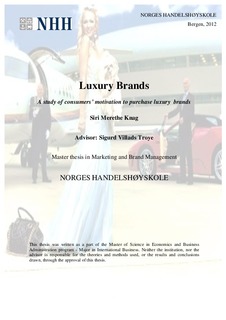Luxury brands : a study of consumers' motivation to purchase luxury brands
Master thesis
Permanent lenke
http://hdl.handle.net/11250/169929Utgivelsesdato
2012Metadata
Vis full innførselSamlinger
- Master Thesis [4372]
Sammendrag
The purpose of this study was to examine consumers’ motives for buying luxury brands. The
underlying motivation for why consumers buy luxury branded products is a field that is still
lacking former research. The main objective of my research in this thesis was thus to provide
new, interesting discoveries to the phenomenon luxury and purchasing motives. The
assigned problem was to identify the associations that consumers have with a luxury fashion,
brand and compare them with their associations with a non-luxury fashion brand, to better
understand their preferences towards luxury. I have looked into different factors that can
influence the consumers’ behaviour, such as their explicit and implicit self-esteem, as well as
the relationship between themselves and the brands.
To present an overall understanding of the luxury phenomenon, I have provided literature
review of definitions, and typologies for characteristics, categories, and dimensions used for
luxury. Additionally, I have included theories regarding consumers’ self-esteem; (Gebauer et
al., 2008, Park and John, 2011, Leonard et al., 1995, Truong and McColl, 2011, Bosson et
al., 2000), as well as consumption practices (Holt, 1995). To further extend the theoretical
basis for the task, I have been inspired to use well-established luxury theories, "Brand
Luxury Index" (Vigneron and Johnson, 2004) and "Luxury Value Model" (Wiedmann et al.,
2007).
I have done a qualitative study, by conducting a survey to reveal the associations, attitudes,
and relationships that the consumers have with luxury brands (and non-luxury brands), as
well as the respondents’ level of self-esteem. The survey was conducted among students at
the Norwegian School of Economics (NHH).
The results reveal that consumers have stronger − and a larger number of − associations with
luxury brands, than with non-luxury brands. Their attitudes towards the luxury brands are
furthermore more positive than towards non-luxury brands. The respondents feel a stronger
relationship with the non-luxury brands, however, than they do with luxury brands.
Moreover, the results indicate that men and women possess some different types and
amounts of associations with luxury brands. The respondents also show little discrepancies
between their level of implicit and explicit self-esteem. The results of this study can be
helpful to better understand the consumers’ motives for purchasing luxury.
